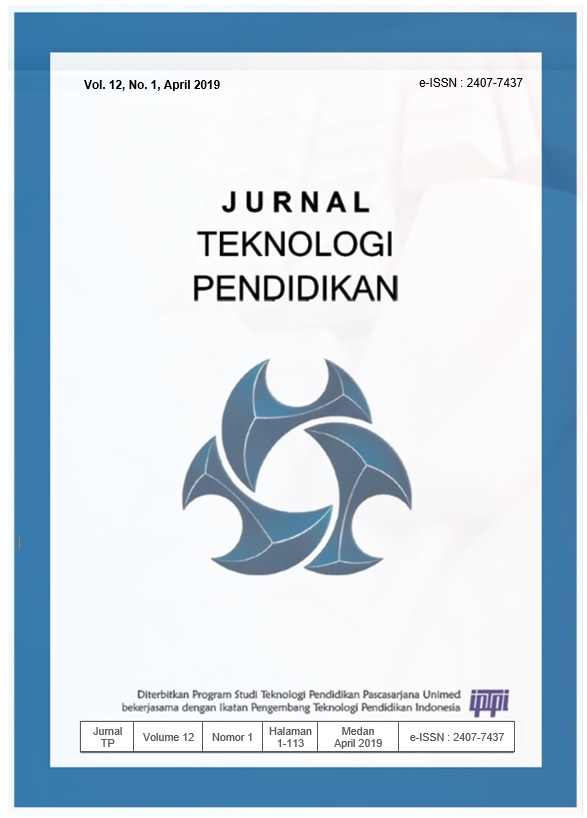PENGARUH MODEL PEMBELAJARAN KOOPERATIF TSTS“NHT DAN GAYA BELAJAR TERHADAP HASIL BELAJAR PENGANTAR BISNIS
DOI:
https://doi.org/10.24114/jtp.v12i1.14505Abstract
Abstrak: Penelitian ini bertujuan :(1) Untuk mengetahui hasil belajar pengantar bisnis mahasiswa yang diajar dengan model pembelajaran kooperatif tipe TST lebih tinggi dari mahasiswa yang diajar dengan model pembelajaran kooperatif tipe NHT. (2) Untuk mengetahui hasil belajar pengantar bisnis mahasiswa yang memiliki gaya belajar teoritis dan mahasiswa yang memiliki gaya belajar pragmatis. (3) Untuk mengetahui interaksi antara model pembelajaran kooperatif dengan gaya belajar terhadap hasil belajar pengantar bisnis. Penelitian ini dilaksanakan di Universitas Methodist Indonesia. Populasi berjumlah 180 orang. Pengambilan sampel dilakukan dengan cluster random sampling. Metode penelitian kuasi eksperimen dengan desain faktorial 2 x 2 dilanjutkan dengan statistik inferensial dengan menggunakan ANAVA dua jalur dengan taraf signifikan α = 0,05 yang dilanjutkan dengan uji Scheffe. Hasil penelitian menunjukkan: (1) hasil belajar pengantar bisnis mahasiswa yang diajarkan dengan model pembelajaran kooperatif tipe TSTS lebih tinggi dari pada hasil belajar pengantar bisnis mahasiswa yang diajarkan dengan model pembelajaran kooperatif tipe NHT; (2) hasil belajar pengantar bisnis mahasiswa yang memiliki gaya belajar teoritis lebih tinggi dari pada hasil belajar pengantar bisnis mahasiswa yang memiliki gaya belajar pragmatis; (3) terdapat interaksi antara model pembelajaran kooperatif dengan gaya belajar dalam mempengaruhi hasil belajar mahasiswa. Kata Kunci: model pembelajaran kooperatif, TST, NHT, gaya belajar, pengantar bisnis. Abstract: This study aims: (1) To find out the introductory learning outcomes of business students who are taught with the cooperative learning model of the TST type are higher than students who are taught with the cooperative learning model of the NHT type. (2) To find out the introductory learning outcomes of business students who have theoretical learning styles and students who have pragmatic learning styles. (3) To determine the interaction between cooperative learning models with learning styles on introductory business learning outcomes. This research was conducted at the Methodist University of Indonesia. The population is 180 people. Sampling was done by cluster random sampling. Quasi-experimental research method with 2 x 2 factorial design followed by inferential statistics using two-way ANAVA with a significant level α = 0.05 followed by the Scheffe test. The results showed: (1) the results of introductory business learning students who were taught with the cooperative learning model type TSTS were higher than the results of introductory business learning students who were taught with the NHT type cooperative learning model; (2) the results of introductory business learning students who have theoretical learning styles are higher than the results of introductory business learning students who have pragmatic learning styles; (3) there is an interaction between cooperative learning models and learning styles in influencing student learning outcomes. Keywords: cooperative learning model, TST, NHT, learning style, business introduction.Downloads
Published
09-09-2019
How to Cite
Aritonang, M., K, A. H., & Situmorang, J. (2019). PENGARUH MODEL PEMBELAJARAN KOOPERATIF TSTS“NHT DAN GAYA BELAJAR TERHADAP HASIL BELAJAR PENGANTAR BISNIS. Jurnal Teknologi Pendidikan (JTP), 12(1), 88–100. https://doi.org/10.24114/jtp.v12i1.14505
Issue
Section
Articles
License

Jurnal Teknologi Pendidikan (JTP) is licensed under a Lisensi Creative Commons Atribusi 4.0 Internasional.




